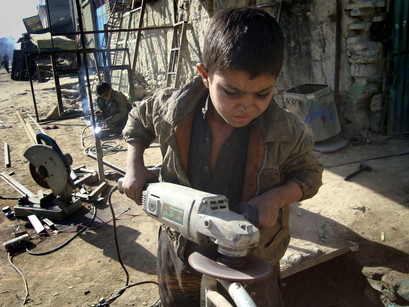Anne Goddard
As the U.S. military involvement in Afghanistan enters its 10th year, it is notable that most Afghan children have never known peace. Unlike confrontations fought on distant battlefields, the inherent peril of war has found intimacy within their homes and villages. When the threat of dying is real and ever-present, it shapes your view of the world. Fear is not an emotion these children have learned to live with as much as a defining component of who they will become.

Mohammad Gul, an eight-year-old Afghan boy, works in a welding shop in Khost, Dec. 11, 2010. Thousands of Afghan children work to help in supporting their families in Afghanistan due to extreme poverty. (Photo: AP/Nishanuddin Khan)
How has the war affected the children of Afghanistan? Given a lifetime set amid missile strikes and IEDs, what do they hope for, what do they fear, what do they need?
ChildFund International's work in more than 150 Afghan communities over the past decade has provided some insights to these questions, but we wanted to discern the answers more broadly. We conducted a survey of 10 to 12-year olds, posing to them six basic questions. Their answers -- bearing the honesty and forthrightness of children everywhere -- speak volumes about their lives on the front lines of war.
But first, some context. Even beyond the dangers of war, the children of Afghanistan historically have known hardship. The country has the highest infant mortality rate in the world. One in four kids don't live to see their fifth birthday, and only one in five has access to clean drinking water. Fewer than 20 percent of girls 15- to 24-years-old are literate. Child labor and child marriages are commonplace. Life expectancy is 44 years.
In a nation with so much deprivation, we asked Afghan's children what they need most. Their answers amplify a situation that many Americans are unaware of. With war stories dominating the headlines, the needs of Afghan children are often unheard. Almost half those surveyed (45 percent) said that food was their paramount necessity. Afghanistan's children are not getting enough to eat.
Similarly, when we asked them on what they would spend the equivalent of one U.S. dollar, one in three (36 percent) said food. The answer is predictable given this survey finding: 56 percent of the children surveyed go to bed hungry at least one night a week.
To put the extent of their hunger in context, more than four times as many children said that they needed "food" more than those who answered "peace."
But what they need and what they fear are decidedly different. When we asked them "what are you most afraid of?" there were expected answers from 10 to 12-year-olds -- snakes (13 percent) and wild dogs (15 percent). But the overwhelming answer was "war." One in two kids (45 percent) said they were fearful of the bombings, air strikes and suicide attacks that have become commonplace in their country.
"I am afraid of war," said one child, "because it has killed the children and youth of our country."
And yet, the children have not lost hope. One common theme that emerged from the survey was how seriously Afghan kids take their education. One in five said that what they needed most was a school or school supplies. When we asked them what they would do if they were the president of Afghanistan, half of them said they would build or provide more money for schools and "education for all children."
Despite an interest in education, however, many Afghan children are so busy with their daily chores and other work obligations that they do not have time for their studies. Half of the kids surveyed (50 percent) said they spend "half a day" working and fulfilling their household duties.
There are epic struggles taking place in Afghanistan, but beneath the global headlines are stories of survival and hope from among the country's smallest voices. Not so small, however, that the rest of the world cannot hear them. It is my hope, with statistics and stories like these, that the world will start to listen.



